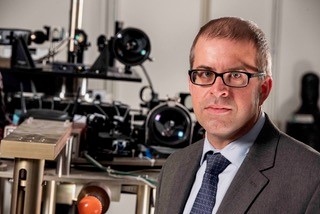Abstract:
The Lunar Reconnaissance Orbiter (LRO) was launched in 2009 for a three-year nominal mission to map the Lunar surface. Nearly 15 years later,
the LRO continues to produce data that have become essential for planning future missions to the Moon. As a spacecraft operating beyond its initial
design life, LRO's extended missions have stressed its attitude control system in a variety of ways. This talk will describe how pseudospectral optimal
control theory and Hamiltonian programming have been used to breathe new life into this aging spacecraft through a new autonomous maneuvering concept
called FastMan (Fast Maneuvering) attitude guidance. FastMan guidance has added new capabilities that have permitted Lunar observations never before
possible, despite the loss of the spacecraft’s gyro package. FastMan is a practical example of how continued advancements in computational optimal control
theory and its real-world implementation can be seamlessly integrated into space missions with challenging engineering and operational constraints. The
application is not limited to LRO. The approach can be adapted to many other space science missions by leveraging the flight heritage that has been established
as LRO continues to explore the Moon.
In this seminar, the concept of a time-optimal attitude maneuver as originally developed by Bilimoria and Wie will be reviewed. The evolution of the idea to
incorporate physics, engineering, and operational constraints, e.g. asymmetric mass properties, maneuver rate limits, pointing constraints etc., associated with
a practical spacecraft will be described leading to the first flight experiment on NASA’s TRACE satellite and recent operational implementation of FastMan on LRO.
Operationalizing FastMan required the new approach to be incorporated into an existing mission architecture. Some adaptation of the ground software toolchain was
needed for a smooth workflow. A flight software patch was also developed and incorporated on the spacecraft to improve the efficiency of implementing the new
FastMan slews. Aspects of these modifications will be discussed. To date, FastMan has been used to perform hundreds of slews and some recent flight results will be
presented to illustrate that it is indeed possible to teach an old spacecraft some new tricks.
Biography:
Dr. Mark Karpenko is a Research Professor in the Department of Mechanical and Aerospace Engineering at the Naval Postgraduate School (NPS). He received
the PhD degree in Mechanical Engineering in 2009 with a focus on robust control of mechanical engineering systems. Dr. Karpenko has extensive experience with guidance
and control hardware, computer modeling of aerospace guidance and control systems and in developing and implementing hardware-in-the-loop (HIL) test environments to
evaluate advanced control concepts. He also has extensive experience in trajectory optimization for space systems. Dr. Karpenko was a lead engineer on the NASA’s TRACE
Optimal Maneuver Experiment in which time-optimal attitude maneuvers were developed and implemented for the first time on an orbiting satellite. Dr. Karpenko is now
working with NASA’s Goddard Space Flight Center to operationalize the concept on the Lunar Reconnaissance Orbiter in support of NASA’s return to the moon. Dr. Karpenko
is a co-inventor of 9 issued US government patents and 4 pending US government patents. He has published over 100 technical papers on topics including trajectory
optimization, robust control, attitude estimation, engineering applications of artificial intelligence, satellite attitude control and guidance algorit¬hms. Dr. Karpenko
has received the NASA NESC Award for Engineering Excellence, the NASA NESC Group Achievement Award and is an Associate Fellow of the AIAA.
